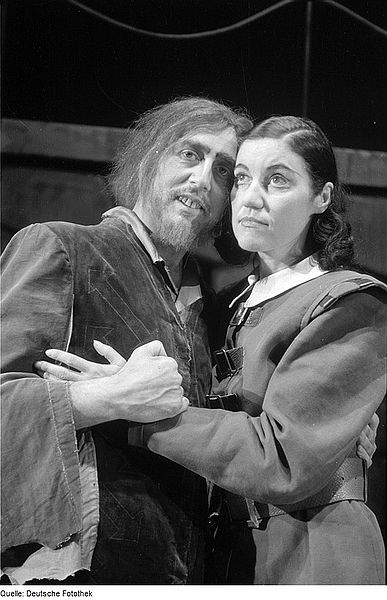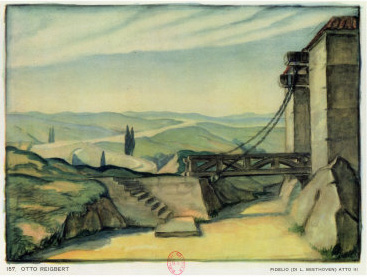Music with Ease > 19th Century German Opera (except Wagner) > Fidelio (Beethoven)
Fidelio
An Opera by Ludwig van Beethoven
The subject of the opera was derived from Bouilly’s "Leonore; or, Conjugal Love." It had already been used for a French opera comique, as well as for an opera, to Italian works, by Paer, a composer who accompanied Napoleon to Warsaw and Posen, and in 1807 was formally installed as his maitre de chapelle. Indeed, it was a performance of Paer’s work which suggested "Fidelio" to Beethoven, who had a German translation prepared.
The leading incident in the plot -- the rescue of an unjustly detained prisoner through the devotion of a friend whose life is risked but not lost -- corresponds with that of three operas by Cherubini, whom Beethoven called "the greatest of all living writers for the stage." It is a simple plot, but lofty in design and exhibiting a purity of motive not usually found in opera texts.

Florestan (Günther Treptow) and Leonore (Karina Kutz) in Beethoven's opera, Fidelio. (Production of September 1945 at the Deutsche Oper, Berlin.)
Pizarro, the governor of a State prison in Spain, entertaining a bitter enmity against the Don Florestan, a nobleman, seizes and confines him in a loathsome dungeon with the intention of starving him to death. Florestan’s faithful wife, Leonora, disguises herself in male attire, and under the name of Fidelio obtains admission to the prison as servant to Rocco, the head warder. Pizarro, having been informed of the approaching visit of the Minister Ferdinand, on a tour of inspection, tries to persuade Rocco to kill Florestan. Rocco, while refusing, agrees to dig his grave if Pizarro will himself commit the murder.
Leonora, partially overhearing their plans, takes advantage of the passion with which, as a boy, she had inspired the warder’s daughter, Marcelline (who is affianced to Jaquino the porter), and thinking that Florestan’s life may be the one intended to be sacrificed, persuades Rocco to let her accompany him to the dungeon as an assistant. On entering the cell, Leonora immediately knows her husband by his voice, but conceals her emotion and helps Rocco to prepare the grave. When all is ready, Pizarro descends to dungeon and attempts to stab his prisoner. But Leonora, declaring herself Florestan’s wife, resolutely throws herself between them. Pizarro, in defeated rage, is about to sacrifice both to his fury, when Leonora draws a pistol and defies him. At this moment the arrival of the Minister Ferdinand is heralded by a flourish of trumpets. Pizarro hurries away to receive his superior, and husband and wife rush into each other’s arms. The deeply-laid plot is divulged to the Minister, who orders Pizarro to be deposed, and rewards the devotion of Leonora by bidding her with her own hands remove her husband’s chains and restore him to liberty.
Beethoven wrote "Fidelio" in the full maturity of his creative powers, and it stands alone among operas, with great and peculiar qualities of its own. Its general style is serious and lofty, and stongly dramatic. Like "The Magic Flute," it bears traces of the old German "Singspiele" (a sort of popular vaudeville copiously sprinkled with songs) in its snatches of spoken dialogue; but these, when rightly uttered, can easily be made to emphasise the emotions produced by the music. So far from suggesting any feeling of anti-climax, the sudden relapse into agitated speech often gives an effect more thrilling than any music could command," says Mr. Streathfeild. For the rest, one has to admit that the many well-known numbers in the opera seem to find more favour in the concert-room than on the stage.
"Fidelio" was first performed at the Kaerntnerthor Theatre, Vienna, on November 20, 1805. The rehearsals had been attended with extraordinary difficulties, especially in regard to the singers. They complained that portions of the work were unsingable, but Beethoven, with his usual obstinacy, declined to make any concessions. He had trouble also with the band. Writing only two days before the public performance, he says: "Pray try to persuade Seyfried to conduct my opera to-day, as I wish to see and hear it from a distance; in this way at least my patience will not be so severely tried by the rehearsal as when I am close enough to hear my music bungled." This was one advantage of his deafness! "I really do believe it is done on purpose," he continues. "All pp., cres., all decresc., and f., ff., may as well be struck out of my music, since not one of them is attended to. I lose all desire to write anything more if my music is to be so played." To another friend he wrote that "the whole business of the opera is the most distressing thing in the world."
The circumstances of the first performance were also unfavorable, for the French army had only seven days before invaded Vienna, and the chief nobility and other wealthy patrons of music had deserted the town. Three performances were given, and the opera was then withdrawn by the composer himself. It was given again in 1806, with extensive alterations and a new overture, but its success was still doubtful. There was a revival in 1814, with further alterations and a new Overture in E, the fourth which had been written for it. On this occasion its beauties were better appreciated, but never during Beethoven’s lifetime was "Fidelio" understood as it came to be later. Weber once brought it out at Prague, when, to his disgust, it was coldly received. "Punch and Judy would suit them better," he said. It is to be regretted that we do not hear it more frequently now, especially as for its efficient representation there is only needed some half-dozen leading singers, a chorus, an ordinary orchestra, and a couple of scenes such as any provincial theatre could provide at a few hours’ notice.
FIDELIO POSTER

Set Design For Act II of the Opera "Fidelio" by Ludwig Van Beethoven
Size: 24 in x 18 in.
Giclee Print.
Buy at AllPosters.com
Music With Ease | About Us | Contact Us | Privacy | Sitemap | Copyright | Terms of Use © 2005-25 musicwithease.com. All Rights Reserved. |
